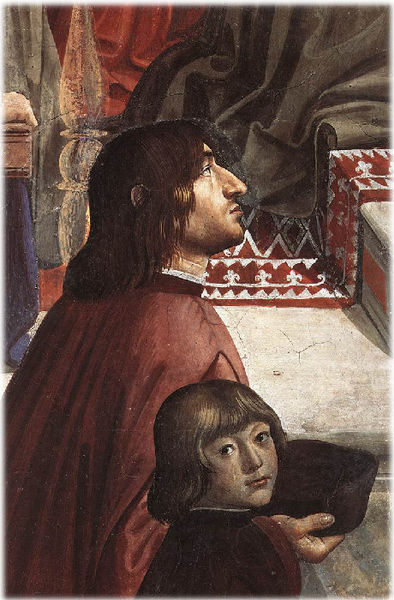<Back to Index>
- Humanist Scholar and Poet Angelo Ambrogini (Poliziano), 1454
PAGE SPONSOR

Angelo Ambrogini, commonly known by his nickname, anglicized as Politian, Italian Poliziano, Latin Politianus (from his birthplace, Montepulciano, Latin Mons Politianus) (14 July 1454 – 24 September 1494) was an Italian Renaissance classical scholar and poet, one of the revivers of Humanist Latin. He used his didactic poem Manto, written in the 1480s, as an introduction to his lectures on Virgil.
Politian was born as Angelo Ambrogini in Montepulciano, in central Tuscany in 1454; he is known in literary annals as Angelo Poliziano or Politianus, from his birthplace. His father, Benedetto, a jurist of good family and distinguished ability, was murdered by political antagonists for adopting the cause of Piero de' Medici in Montepulciano; this circumstance gave his eldest son, Angelo, a claim on the House of Medici.
At the age of 10, after the premature death of his father, Politian began his studies at Florence, as the guest of a cousin. There he learned the classical languages of Latin and Greek. From Marsilio Ficino he learned the rudiments of philosophy. At 13 he began to circulate Latin letters; at 17 he wrote essays in Greek versification; and at 18 he published an edition of Catullus. In 1470 he won the title of homericus adulescens by translating books II - V of the Iliad into Latin hexameters. Lorenzo de' Medici, who was then the autocrat of Florence and the chief patron of learning in Italy, took Politian into his household, made him the tutor of his children, and secured him a distinguished post in the University of Florence.
Among Politian's pupils could be numbered the chief students of Europe, the men who were destined to carry to their homes the spolia opima of Italian culture. He also educated students from Germany, England and Portugal.
It was the method of professors at that period to read the Greek and Latin authors with their class, dictating philological and critical notes, emending corrupt passages in the received texts, offering elucidations of the matter, and teaching laws, manners, religious and philosophical opinions of
the ancients. Poliziano covered nearly the whole ground of classical
literature during his tenure, and published the notes of his courses upon Ovid, Suetonius, Statius, Pliny the Younger, and Quintilian. He also undertook a recension of the text of the Pandects of Justinian I, which formed the subject of one of his courses. This recension influenced the Roman code.
It is likely that Politian was homosexual, or at least had male lovers, and he never married. Evidence includes denunciations of sodomy made to the Florentine authorities, poems and letters of contemporaries, allusions within his work (most notably Orfeo), and the circumstances of his death. The last suggests he was killed by a fever (possibly resulting from Syphilis) which was exacerbated by standing under the windowsill of a boy he was infatuated with despite being ill. He may also have been a lover of Pico della Mirandola.
But it's just as likely that his death was precipitated by the loss of his friend and patron Lorenzo de' Medici in April 1492. Poliziano himself dying on 24 September 1494, just before the wave of foreign invasion which was gathering in France swept over Italy.
In 2007, the bodies of Poliziano and Pico della Mirandola were exhumed from St. Mark's Basilica in Florence. Scientists under the supervision of Giorgio Gruppioni, a professor of anthropology from Bologna,
used current testing techniques to study the men's lives and establish
the causes of their deaths. A TV documentary is being made of this
research, and
it was recently announced that these forensic tests showed that both
Poliziano and Pico della Mirandola likely died of arsenic poisoning.
The chief suspect is Piero de' Medici, the successor of Lorenzo de' Medici and docent of Florence, but there are others.
Poliziano was well known as a scholar, a professor, a critic, and a Latin poet in an age when the classics were still studied with assimilative curiosity, and not with the scientific industry of a later period. He was the representative of that age of scholarship in which students drew their ideal of life from antiquity. He was also known as an Italian poet, a contemporary of Ariosto.
At the same time he was busy as a translator from the Greek. His versions of Epictetus, Hippocrates, Galen, Plutarch's Eroticus and Plato's Charmides distinguished him as a writer. Of these learned labors, the most universally acceptable to the public of that time were a series of discursive essays on philology and criticism, first published in 1489 under the title of Miscellanea. They had an immediate and lasting effect, influencing the scholars of the next century.
Anthony Grafton writes that Poliziano's "conscious adoption of a new standard of accuracy and precision" enabled him "to prove that his scholarship was something new, something distinctly better than that of the previous generation":
By treating the study of antiquity as completely irrelevant to civic life and by suggesting that in any case only a tiny elite could study the ancient world with adequate rigor, Poliziano departed from the tradition of classical studies in Florence. Earlier Florentine humanists had studied the ancient world in order to become better men and citizens. Poliziano by contrast insisted above all on the need to understand the past in the light of every possibly relevant bit of evidence — and to scrap any belief about the past that did not rest on firm documentary foundations... [But] when he set ancient works back into their historical context Poliziano eliminated whatever contemporary relevance they might have had.